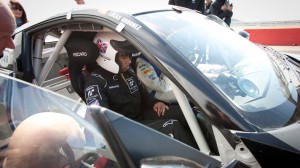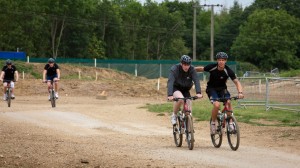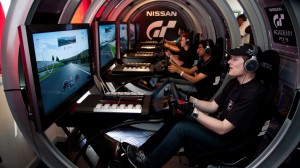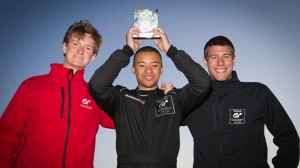From Gran Turismo to Le Mans: How A Gamer Became A Racer
I rarely re-publish news stories from elsewhere, but this particular story is simply too cool to not bring to your attention.
Recently, Grimm and I were chatting about a relatively new type of job that not many people can lay claim to: being a professional video gamer. Now, granted, that’s a somewhat broad term; we both agreed that, in its most general sense, a professional video gamer is someone who, at some point, received some sort of financial compensation from the act of playing video games.
 That said, video gaming can lead to something much more spectacular. To me, a professional video gamer is someone who can actually make a living at nothing but gaming, or his video gaming provides the foundation for some vocation beyond it. In the case of this particular story, video gaming provided the basis for a few very talented young men to become professional racing drivers at the highest level of the sport.
That said, video gaming can lead to something much more spectacular. To me, a professional video gamer is someone who can actually make a living at nothing but gaming, or his video gaming provides the foundation for some vocation beyond it. In the case of this particular story, video gaming provided the basis for a few very talented young men to become professional racing drivers at the highest level of the sport.
I’ve always had a passion for racing and advanced driving. To fuse science, math and raw human skill into a synthesis of machine and reflexes — and to push the envelope all the way to the cancel stamp — is, to me, something approaching nirvana. I’ve rarely felt so alive as when I push the Corvette up to full throttle, and the whole world starts to go blurry. Feeling the margin of error shrink away to nothing makes you hyper-aware of everything happening around you, to the point where your consciousness feels like it’s expanded tenfold. And, at the same time, it takes maniacal levels of single-pointed focus. The endorphins your brain starts dropping into your system are a heady, tingling-extremities experience.
 Thus, I can only imagine how cool it must be to go from playing Gran Turismo in your living room to actually racing at Le Mans. But that’s exactly what’s happened to a few lucky souls.
Thus, I can only imagine how cool it must be to go from playing Gran Turismo in your living room to actually racing at Le Mans. But that’s exactly what’s happened to a few lucky souls.
Sharpen those reflexes, kids. Video games might just get you somewhere.
The following story is reprinted from Top Gear’s website (the story is entitled, “Brit wins 2011 GT Academy”). Copy originally written by Vijay Pattni.
—————
Scientific experimentation has propelled mankind forward in unimaginable and fortuitous ways. For example, before George Foreman’s Lean Mean Grilling Machine, we never knew meat could be toasted sans fat.
Similarly, before Nissan and Sony PlayStation’s GT Academy, the world could only wonder if a bedroom racer used to spending hours hunched over a console in a darkened room could successfully make it as a fully paid-up agent of oversteer.
Guess what – they can.
 You know the story by now. In 2008, the makers of Gran Turismo began pondering whether their millions of worldwide gamers posting stonking lap times around digitised manifestations of real circuits could actually compete in a real car, on a real lap, in the real world; a world where adulation goes hand-in-hand with an explosive method of limb removal.
You know the story by now. In 2008, the makers of Gran Turismo began pondering whether their millions of worldwide gamers posting stonking lap times around digitised manifestations of real circuits could actually compete in a real car, on a real lap, in the real world; a world where adulation goes hand-in-hand with an explosive method of limb removal.
Nissan jumped aboard too, and the first ever Academy was launched. That winner, who beat 25,000 online entrants and the 12 finalists in race camp, was young Spaniard Lucas Ordonez.
‘Yeah right’, you mock. ‘He only beat other slightly podgy, malnourished spotty teenagers’. Well, Mr Ordonez competed in the Le Mans 24hr race last weekend, where his Signatech-Nissan LMP2 claimed a 2nd placed podium finish. Our understanding is that Le Mans is a pretty big deal.
 Lucas told us: “When I first started racing the other drivers would look at me funny. Then I posted some of the fastest lap times and they all suddenly became my friends.”
Lucas told us: “When I first started racing the other drivers would look at me funny. Then I posted some of the fastest lap times and they all suddenly became my friends.”
Now this same journey is about to begin for the 2011 GT Academy champion, 19 year-old Jann Mardenborough. A chap we bumped into last week at Le Mans, who will now go on to become a real-life racing driver.
“I’m buzzing, ecstatic,” said Jann. “This competition is going to change my life massively.”
Jann competed online with over 90,000 entrants across 10 European countries posting lap times onGran Turismo 5, finally making it into the final 12. These 12 hopefuls were flown to Le Mans (in honour of Lucas’ endurance racing debut) where their one-week intensive race camp started, finishing up at Silverstone.
 This camp was a proving ground of racing talent, with each finalist karting, racing Nissan 370Zs, GT-Rs and single seaters, together with high-pressure pursuits, a military-style assault course, driving a GT4-spec 370Z and even channelling their inner Maverick via aerial dog-fights in stunt planes.
This camp was a proving ground of racing talent, with each finalist karting, racing Nissan 370Zs, GT-Rs and single seaters, together with high-pressure pursuits, a military-style assault course, driving a GT4-spec 370Z and even channelling their inner Maverick via aerial dog-fights in stunt planes.
And the scrutiny didn’t stop there. The exhausted racelings were being watched over by head judge Eddie Irvine, and mentors including Johnny Herbert, Vitantonio Liuzzi and the Queen of the ‘Ring herself, Sabine Schmitz.
Said Irvine: “I’ve been surprised by this experience. When I arrived, I saw there was some work to do, but Jann did a great job throughout and the final decision turned out to be fairly straightforward. He’s been given an amazing opportunity by PlayStation and Nissan, but the hard work has only just begun.”
Jann will now be catapulted into a world of safety-harnessed pain: he will compete in a number of UK races to qualify for his international racing licence, and in January 2012 will undertake the Dubai 24hr race in a Nissan 370Z GT4 car.
“I’m not sure about the next Lewis Hamilton,” said Jann, “but being the next Lucas Ordonez would be a pretty good start.”




 LinkedIn
LinkedIn Twitter
Twitter
I would agree with the definition of professional video gamer as being someone who could make a living from it rather than someone who has simply received financial compensation of some sort.Under the latter definition anyone who has won money from a game could be considered a professional which isn’t that hard to do if you place wagers with your friends.I’d be very interested in seeing what the exact lap times these guys are posting,I have a friend that is currently undefeated racing against other drivers on GT5 and SHE is always looking for a real challenge.I’m sad to say my best times only made her yawn,lol,but then i haven’t purchased a racing steering wheel yet as she has.It is nice to see that some ppl are taking gamers skills seriously and giving them real world opportunities based on those skills.I’d very much like to see opportunities like these come to Home someday,the possibilities are almost endless.
The idea that someone could become a professional race car driver from playing video games is fascinating. It makes you wonder where this could lead, what other types of games could be translated into a money making career. The military has long used gaming to hone various skills with simulators, so the concept that your reflexes can be attuned by games isn’t a new one. That being said, the future may hold many kinds of opportunities for ardent gamers at the top of their craft.
Great article and great inspiration to racing gamers out there for other things coming out of their skills. I have heard of how fps gamers have been brought into the military, and so I certainly see how this is possible as well. Here’s to all the future Lucas Ordonez’s out there like Jann Mardenborough and maybe one of you reading this article!
It’s worth noting that the MQ-9 Reaper is an unmanned drone vehicle, and is operated remotely by civilians employed by the CIA. Using video games as simulators to prepare operators for drone attacks is frankly not that big of a leap.
Morality questions aside, it’s certainly a very “Ender’s Game” concept.
Hate to bring up Poker once again but it will make a nice example here.If there were a Poker tourney in Home where the winner would then represent Home,and any other commercial sponsors that might wanna pay Sony a fee,in a real life tourney where the ultimate winner,or even final table, has a chance at getting T.V. time where the sponsors would then get more than their moneys worth then Sony could pocket that cash along with any fees charged to users.There may be licensing obstacles in this example but it’s only suggested as 1 example of how Home could do something like this.I’m sure there are many others.
Should have made this clear in the above example:I meant a real Poker tourney that already exists and is already televised.